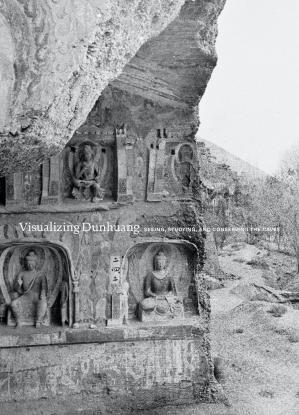Publications
Seeing, Studying, and Conserving the Caves

400 pp. | 11.5 × 8.25
Situated at the crossroads of the northern and southern routes of the ancient silk routes in western China, Dunhuang is one of the richest Buddhist sites in the world, with more than 500 richly decorated cave temples constructed between the fourth and fourteenth centuries. The sculptures, murals, portable paintings, and manuscripts found in the Mogao and Yulin Caves at Dunhuang represent every aspect of Buddhism. From its earliest construction to the present, this location has been visualized by many individuals, from the architects, builders, and artists who built the caves to twentieth-century explorers, photographers, and conservators, as well as contemporary artists.
Visualizing Dunhuang: Seeing, Studying, and Conserving the Caves is a paperback edition of the ninth volume of the magnificent nine-volume hardback set, and examines how the Lo Archive, a vast collection of photographs taken in the 1940s of the Mogao and Yulin Caves, inspires a broad range of scholarship. Lavishly illustrated with selected Lo Archive and modern photographs, the essays address three main areas—Dunhuang as historical record, as site, and as art and art history. Leading experts across three continents examine a wealth of topics, including expeditionary photography and cave architecture, to demonstrate the intellectual richness of Dunhuang. Diverse as they are in their subjects and methodologies, the essays represent only a fraction of what can be researched about Dunhuang. The high concentration of caves at Mogao and Yulin and their exceptional contents chronicle centuries of artistic styles, shifts in Buddhist doctrine, and patterns of political and private patronage—providing an endless source of material for future work.
Contributors include Neville Agnew, Dora Ching, Jun Hu, Annette Juliano, Richard Kent, Wei-Cheng Lin, Cary Liu, Maria Menshikova, Jerome Silbergeld, Roderick Whitfield, and Zhao Shengliang.